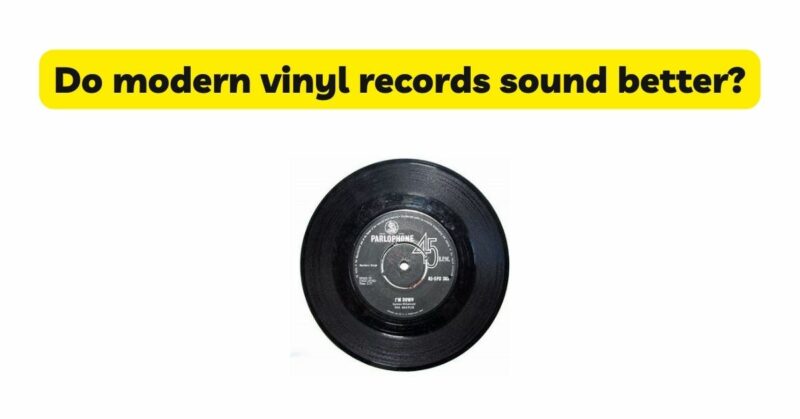In recent years, vinyl records have experienced a remarkable resurgence in popularity, captivating both long-time enthusiasts and a new generation of music lovers. With advancements in technology and production techniques, modern vinyl records have evolved to meet the demands of today’s audiophiles. In this article, we explore the question of whether modern vinyl records sound better than their vintage counterparts. We will examine the impact of contemporary manufacturing processes, vinyl quality, mastering techniques, and the compatibility with modern playback equipment. By considering these factors, we aim to shed light on the sound quality of modern vinyl and its place in the evolving landscape of music consumption.
Manufacturing Techniques: Modern vinyl records benefit from improved manufacturing techniques, drawing upon decades of experience and technological advancements. State-of-the-art pressing plants utilize computer-controlled systems to achieve greater precision and consistency in the production process. This results in reduced surface noise and more accurate sound reproduction compared to some vintage pressings, which may have been subject to manual processes and potential quality variations.
Vinyl Quality: The quality of the vinyl used in modern pressings has significantly improved over the years. Manufacturers now have access to high-quality vinyl formulations that are both durable and optimized for sound quality. Thicker and heavier vinyl can lead to reduced warping and enhanced playback stability, contributing to a better overall listening experience. Moreover, some modern records are pressed on audiophile-grade vinyl, further elevating the sound quality for discerning listeners.
Mastering Techniques: Modern mastering techniques have evolved to accommodate the unique characteristics of vinyl records. Mastering engineers today possess a deep understanding of the vinyl medium, allowing them to optimize the sound for vinyl playback. While vintage records may have been mastered using analog equipment, modern engineers employ a combination of analog and digital tools to achieve precise and detailed sound reproduction. This results in records with improved dynamic range, lower distortion, and a balanced frequency response.
Availability of High-Quality Recordings: Modern vinyl releases often feature high-quality original recordings that were captured digitally and then converted to analog format for vinyl production. This approach allows for the preservation of the audio’s integrity and fidelity, resulting in records with exceptional sound quality. Additionally, some contemporary artists and labels invest significant resources in ensuring that their vinyl releases offer the best possible sound reproduction.
Compatibility with Modern Playback Equipment: The compatibility of modern vinyl records with contemporary playback equipment is an essential factor in determining sound quality. Many turntables available today are designed with specific features to cater to the unique needs of vinyl playback. Advanced tonearms, adjustable tracking force, and high-quality cartridges contribute to accurate tracking and reduced wear on the records. Furthermore, modern amplifiers and speakers are designed to complement the nuances of vinyl playback, delivering exceptional sound quality.
Pressing Quality and Quality Control: The resurgence of vinyl has led to increased demand for records, prompting manufacturers to maintain high standards in pressing quality and quality control. Reputable pressing plants conduct rigorous testing and quality checks throughout the production process to ensure that each record meets the highest standards. As a result, modern vinyl records are less prone to defects and pressing issues that were more common in the past.
Subjective Listening Experience: Ultimately, the perception of sound quality is highly subjective and can be influenced by individual preferences, listening environments, and playback equipment. Some audiophiles may prefer the analog warmth and nostalgic charm of vintage records, while others appreciate the pristine fidelity and clarity offered by modern pressings. Personal taste plays a significant role in determining which sound characteristics are preferred.
Conclusion: The debate over whether modern vinyl records sound better than vintage ones is nuanced and multifaceted. Advancements in manufacturing techniques, vinyl quality, mastering processes, and compatibility with modern playback equipment have undoubtedly elevated the sound quality of contemporary vinyl releases. However, personal preferences, nostalgia, and the unique appeal of vintage records should not be disregarded. Ultimately, the appreciation of vinyl records extends beyond sound quality alone, encompassing the tactile experience, album artwork, and the sense of connection with the music. As technology continues to advance, both vintage and modern vinyl records will continue to hold their place in the hearts of music enthusiasts, offering distinct listening experiences for generations to come.


